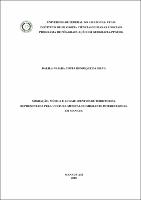| ???jsp.display-item.social.title??? |


|
Please use this identifier to cite or link to this item:
https://tede.ufam.edu.br/handle/tede/6612| ???metadata.dc.type???: | Dissertação |
| Title: | Migração, música e lugar: Identidade territorial representada pela cultura musical do migrante interestadual |
| ???metadata.dc.creator???: | Silva, Dalila Naiara Costa Henrique da  |
| ???metadata.dc.contributor.advisor1???: | Nogueira, Amélia Regina Batista |
| ???metadata.dc.contributor.referee1???: | Melo, João Baptista Ferreira de |
| ???metadata.dc.contributor.referee2???: | Lima, Marcos Castro de |
| ???metadata.dc.contributor.referee3???: | Fortes, Mircia Ribeiro |
| ???metadata.dc.contributor.referee4???: | Barros, Rosemara Staub de |
| ???metadata.dc.description.resumo???: | Estudar migração interna ou migração interestadual em Manaus é descrever a realidade vivida por muitas pessoas. A cidade de Manaus apresenta-se como um lugar repleto de fatores para a existência da migração interestadual sendo o Polo Industrial de Manaus o fator de atração principal para a existência da migração com isso, cria-se a perspectiva de cidade cheia de oportunidades de trabalho para as pessoas, com esta imagem de cidade ideal para se viver o sujeito se desloca de seu lugar natal transformando-se em um migrante interestadual em Manaus. No entanto, com a chegada deste novo morador será que somente os aspectos demográficos e econômicos terão impactos? E os aspectos culturais deste movimento social da migração não sofrerão modificações? O referido estudo partiu do princípio que ao migrar o sujeito traz consigo sua cultura, que serão reproduzidas no seu novo lugar de moradia, demonstrando sua identidade através da manifestação musical, isso quando o migrante se identifica como um indivíduo que veio de outro lugar, (re) significando o seu atual lugar de moradia. Ao ouvir a música que fala do seu lugar natal, o migrante expressa-se como uma pessoa que ainda está ligado com a cultura musical do seu Estado, pois as canções revelam lugares, belezas naturais, manifestações folclóricas, retratam o lugar vivido do sujeito. Valorizando as experiências e narrativas de vida, desenvolvemos a pesquisa qualitativa a partir do princípio fenomenológico dentro da perspectiva da Geografia Humanista Cultural. Para isso, buscamos identificar a territorialidade do migrante interestadual, num primeiro momento, expressa através de dois Festivais Culturais em Manaus: Festival Paraense e Festival Nordestino, dialogando com dois colaboradores, e num segundo momento desenvolvendo entrevistas semi estruturadas com dez comerciantes migrantes que expressam sua identidade territorial, a partir do nome de seus Estabelecimentos Comerciais localizados no bairro Tancredo Neves, Zona Leste de Manaus/AM. Desta forma, podemos perceber a presença do migrante através da identidade que ele desenvolve em um novo lugar, chamado Manaus. |
| Abstract: | To study internal migration or interstate migration in Manaus is to describe the reality lived by many human beings. The city of Manaus, presents itself as a place full of factors of attraction for the existence of interstate migration, the presence of the Industrial Pole of Manaus, creates the perspective of a city full of work opportunities for people, with this city image ideal to live, the subject moves from his native place, transforming himself into an interstate migrant in Manaus. But with the arrival of this new inhabitant will only the demographic and economic aspects have impacts? And will not the cultural aspects of this social movement of migration change? This study was based on the principle that when migrating the subject brings with it his culture, which will be reproduced in his new place of residence, and externalize his identity, through the musical manifestation, when the migrant identifies himself as an individual who came from another place , (re) meaning your current place of residence. When listening to the music that speaks of his native place, the migrant expresses himself as a person who is still connected with the musical culture of his State, because the songs reveal places, natural beauties, folk manifestations, portray the lived place of the subject. Valuing the experiences, and life narratives, we developed the qualitative research from the phenomenological principle, within the perspective of Humanist Cultural Geography. To this end, we sought to identify the territoriality of the interstate migrant, at first expressed through two Cultural Festivals in Manaus, Festival Paraense and Festival Nordestino, dialoguing with two collaborators, and in the second moment developing semistructured interviews with ten migrant merchants that express their territorial identity, based on the name of its Commercial Establishments, located in the district Tancredo Neves, East Zone of Manaus / AM. In this way, we can perceive the presence of the migrant through the identity that he develops in a new place, called Manaus. |
| Keywords: | migração interestadual Geografia Humanista Cultural Migrante Representação Cultura Musical Migração interna |
| ???metadata.dc.subject.cnpq???: | CIÊNCIAS HUMANAS: GEOGRAFIA |
| Language: | por |
| ???metadata.dc.publisher.country???: | Brasil |
| Publisher: | Universidade Federal do Amazonas |
| ???metadata.dc.publisher.initials???: | UFAM |
| ???metadata.dc.publisher.department???: | Instituto de Ciências Humanas e Letras |
| ???metadata.dc.publisher.program???: | Programa de Pós-graduação em Geografia |
| Citation: | SILVA, Dalila Naiara Costa Henrique da. Migração, música e lugar: Identidade territorial representada pela cultura musical do migrante interestadual em Manaus. 2018. 133 f. Dissertação (Mestrado em Geografia) - Universidade Federal do Amazonas, Manaus, 2018. |
| ???metadata.dc.rights???: | Acesso Aberto |
| URI: | https://tede.ufam.edu.br/handle/tede/6612 |
| Issue Date: | 4-Jun-2018 |
| Appears in Collections: | Mestrado em Geografia |
Files in This Item:
| File | Description | Size | Format | |
|---|---|---|---|---|
| Dissertação_Dalila N.C.H. Silva | 3.49 MB | Adobe PDF |  Download/Open Preview |
Items in DSpace are protected by copyright, with all rights reserved, unless otherwise indicated.




